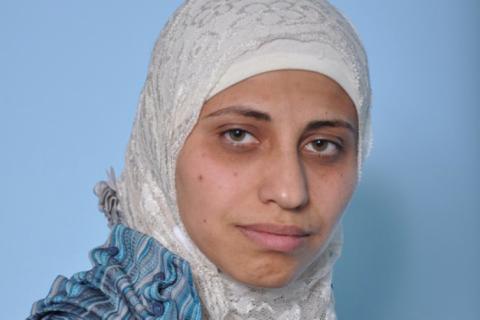As Palestinian poet Dareen Tatour’s next hearing approaches, Alkarama requests urgent intervention of UN Special Rapporteur on freedom of expression

“A poem stands accused,
my poem morphs into a crime.
In the land of freedom,
the artist’s fate is prison.”
Extract from “A Poet Behind Bars” by Dareen Tatour, translated by Tariq al Haydar
In the early hours of the morning on October 11, 2015, officers of the Nazareth Police, escorted by a unit of Israel’s Border Police, raided the home of Palestinian poet Dareen Tatour, and arrested her without presenting a warrant nor providing any reasons for the arrest.
While in custody, she was forced to sign an investigation report that she was not allowed to read beforehand. In fact, Tatour was not informed of the charges against her until November 2, 2015, when she was indicted with “incitement to violence” and “support of a terrorist organisation” by the Magistrates’ Court in Nazareth. The two charges were based on her poetry, as well as her activity on social media.
A mistranslation submitted as evidence
On October 3, Tatour had posted a video to YouTube of a reading of her poem “Resist, My People, Resist Them”, which she then shared on Facebook. During her trial, which began on April 13, 2016, the prosecution and defence debated the translation of certain passages of the poem.
In the poem, Tatour used the word “shahid” (شهيد), an Arabic term for “martyr”. The prosecution claimed that the word “shahid”, when grammatically adjusted into Hebrew, refers to Palestinians who were killed while carrying out attacks on Israelis. However, the defence argued that this evidence was based on a mistranslation of the poem, and, in fact, the word is used to refer to individuals who had been killed wrongfully.
In her poem, Tatour referred to several cases of Palestinians who were killed by the Israeli army or Israeli settlers. The line “As for Hadil, they sniped her in public,” refers to the case of 19-year-old student Hadeel al-Hashlamon, who was shot by Israeli soldiers at a checkpoint in Hebron in September 2015.
Tatour also refers to 18-month-old Ali Dawabsheh, who died during an arson attack on his home in the village of Duma, carried out by Israeli settlers in the middle of the night on July 31, 2015. Ali’s parents, Saad and Reham, later succumbed to the injuries they sustained that night, while Ali’s older brother, Ahmed, was the only survivor of the attack.
In a video interview with AJ+ published in September 2016, Tatour stated: “the poem talks about a human issue we [Palestinians] experience every day, but it was wrongly translated, and so it transformed from a human poem into a poem of incitement, according to the Israeli law.”
Additional charges violate right to freedom of expression
Tatour’s indictment also mentioned a Facebook post of October 4, 2015, which contains a reference to Islamic Jihad’s call for a “continuation of the intifada” in the West Bank, as well as a photograph posted of Isra’a Abed, an Arab-Israeli woman who was shot by security officers in the Afula bus station, captioned with the phrase “I will be the next martyr.”
Tatour’s judicial harassment falls within the context of an increasing number of detentions of Palestinians due to their activity on social media. Since 2015, 280 Palestinians have been arrested for posts or “likes” on social media.
The charges against Tatour equate the use of artistic expression calling for the fulfilment of the Palestinians’ right to self-determination with an act of terrorism, even though Tatour neither called for nor expressed support for any form of terrorism or violence against Israeli civilians.
Upcoming hearing
Tatour has been under house arrest since her pre-trial detention ended on January 13, 2016. She is required to wear an electronic ankle bracelet, and remains deprived of access to the internet. On December 4, 2017, the Israeli court in Nazareth rejected Tatour’s appeal to end her house arrest.
No date for a final verdict on her case has been set, though a new hearing has been scheduled for December 28, 2017, during which both the prosecution and defence will have the opportunity to provide complementary oral summaries. If convicted, Tatour could face a sentence of up to eight years in prison.
On December 15, 2017, Alkarama sought the urgent intervention of the United Nations Special Rapporteur on the promotion and protection of the right to freedom of opinion and expression, David Kaye, requesting him to urge the Israeli authorities to put an end to Tatour’s house arrest immediately and unconditionally. Alkarama further requested that the Special Rapporteur insist that all charges held against her be dropped, as she is being held solely for her peaceful exercise of her right to freedom of expression.
Although the protection of national security is seen under Article 19 of the International Covenant for Civil and Political Rights to be a legitimate justification for restricting the right to freedom of expression, the ongoing judicial proceedings against Tatour fail to demonstrate the direct and immediate connection between the content published and the threat it might have posed. Thus, the necessity requirement for keeping Tatour under house arrest and denying her access to the internet has not been established.
For more information or an interview, please contact media@alkarama.org (Dir: +41 22 734 1008)
